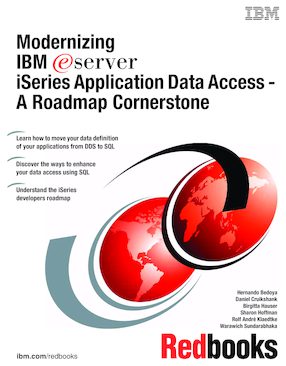Modernizing IBM eServer iSeries Application Data Access - A Roadmap Cornerstone
An IBM Redbooks publication
Note: This is publication is now archived. For reference only.

Published on 17 February 2005
ISBN-10: 0738492132
ISBN-13: 9780738492131
IBM Form #: SG24-6393-00
Authors: Hernando Bedoya, Birgitta Hauser has, Rolf AndrŽ Klaedtke, Sharon Hoffman and Warawich Sundarabhaka
In 1978 IBM introduced the System/38 as part of its midrange platform hardware base. One of the many outstanding features of this system was the built-in Relational Database Management System (RDMS) support. The system included a utility for defining databases, screens, and reports. This utility used a form named Data Description Specifications (DDS) to define the database physical (PF) and logical (LF) files (base tables, views, and indexes).
In 1988, IBM announced the AS/400. The OS/400 operating system also contained a built-in RDMS, however, IBM offered Structured Query Language (SQL) as an alternative to DDS for creating databases. In addition, SQL Data Manipulation Language (DML) statements were made available as an ad hoc query language tool. These statements could also be embedded and compiled within high level language (HLL) programs.
SQL Data Definition Language (DDL) has become the industry standard for defining RDMS databases.
Many customers are in the process of modernizing their database definition and the database access. This IBM Redbooks publication will help you understand how to reverse engineer a DDS-created database along, and provides you with tips and techniques for modernizing applications to use SQL as the database access method.
Additional Resources on DB2 for i Modernization:
DDS and SQL - The Winning Combination for DB2 for i Modernization
Case Study:Modernizing a DB2 for i Application
Case Study:DB2 for i SQL Performance
DB2 for i Modernization Workshop
Modernizing Database Access - The Madness Behind the Methods
Part 1. Introduction and background
Chapter 1. iSeries Developer Roadmap - The big picture
Chapter 2. Why modernize with SQL and DB2 UDB for iSeries
Part 2. Data definition
Chapter 3. Approaches and options
Chapter 4. Modernizing database definitions
Part 3. Data access
Chapter 5. Creating I/O modules to access SQL objects
Chapter 6. Moving business rules to the database
Chapter 7. Embedded SQL
Chapter 8. Externalizing data access
Chapter 9. Other considerations
Part 4. Tools
Chapter 10. DB2 Development Tools